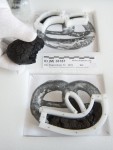 Archaeologists excavating the Danube Market location of Regensburg, Bavaria, have discovered the charred remains of two pretzels, three bread rolls and a croissant that date to the 18th century. Radiocarbon dating placed the baked goods to between 1700 and 1800, but historical research suggests they were made in the second half of the century. While very ancient bread products have survived thanks to charring — Herculaneum leaps to mind — these are the oldest pretzels ever found.
Archaeologists excavating the Danube Market location of Regensburg, Bavaria, have discovered the charred remains of two pretzels, three bread rolls and a croissant that date to the 18th century. Radiocarbon dating placed the baked goods to between 1700 and 1800, but historical research suggests they were made in the second half of the century. While very ancient bread products have survived thanks to charring — Herculaneum leaps to mind — these are the oldest pretzels ever found.
The Danube Market site has been a rich source of archaeological finds. The waterlogged soil next to the river has preserved a swath of history that would otherwise have decayed, like the remains of wooden house that is 1,200 years old (the only Carolingian home ever found in Bavaria), a medieval place of execution and a wooden jetty that is at least 1,100 years old.
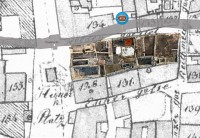 The site was excavated between 2012 and 2014 to thoroughly explore its archaeological layers before construction of the Museum of the Bavarian History to mark the 100-year anniversary of the Free State of Bavaria in 2018. Archaeologists found the bakery goodies in the remains of a house that once stood at number 3 Hunnenplatz which was demolished in 1964 along with much of the neighborhood. City archives indicate that the house at 3 Hunnenplatz was bought by one Johann Georg Held, a master baker, in 1753. He used it as his shop for years. The house remained a bakery for more than a century even as it passed through different hands. The last known baker to reside there was Karl Schätz in 1881.
The site was excavated between 2012 and 2014 to thoroughly explore its archaeological layers before construction of the Museum of the Bavarian History to mark the 100-year anniversary of the Free State of Bavaria in 2018. Archaeologists found the bakery goodies in the remains of a house that once stood at number 3 Hunnenplatz which was demolished in 1964 along with much of the neighborhood. City archives indicate that the house at 3 Hunnenplatz was bought by one Johann Georg Held, a master baker, in 1753. He used it as his shop for years. The house remained a bakery for more than a century even as it passed through different hands. The last known baker to reside there was Karl Schätz in 1881.
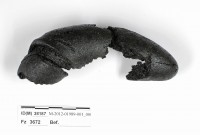 Archaeologists believe the pretzels, rolls and croissant were burnt to a crisp under Held’s tenure, probably part of a tray of failed baked goods that were thrown away. They were found in a waste pit dug into the soil in the corner of the house. Once dumped into the pit, the charred breads were covered with soil. With the moisture firmly burned out of them and the soil they were buried in low in oxygen, the discarded pretzels and friends survived intact for 250 years and now Mr. Held’s trash is our treasure.
Archaeologists believe the pretzels, rolls and croissant were burnt to a crisp under Held’s tenure, probably part of a tray of failed baked goods that were thrown away. They were found in a waste pit dug into the soil in the corner of the house. Once dumped into the pit, the charred breads were covered with soil. With the moisture firmly burned out of them and the soil they were buried in low in oxygen, the discarded pretzels and friends survived intact for 250 years and now Mr. Held’s trash is our treasure.
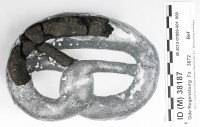 There are many origin stories for the pretzel with Italy and France in the running as the starting point as well as Germany. Whichever country it was in, it was likely a monastery kitchen that baked the first pretzels in the early Middle Ages. The looped form of the pretzel was said to be inspired by the crossed arms of monks, and a simple flour and water pretzel became a traditional Lent food since Catholics were forbidden from
There are many origin stories for the pretzel with Italy and France in the running as the starting point as well as Germany. Whichever country it was in, it was likely a monastery kitchen that baked the first pretzels in the early Middle Ages. The looped form of the pretzel was said to be inspired by the crossed arms of monks, and a simple flour and water pretzel became a traditional Lent food since Catholics were forbidden from 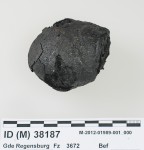 eating eggs and dairy. By the 12th century pretzels were firmly ensconced in the secular culture of southern Germany where the pretzel was the symbol of bakers and bakery guilds. Pretzels were a special issue in the beginning, baked and sold on Saturdays only. In 1532 that changed when the Duke of Bavaria ordered all bakers to make and sell pretzels daily.
eating eggs and dairy. By the 12th century pretzels were firmly ensconced in the secular culture of southern Germany where the pretzel was the symbol of bakers and bakery guilds. Pretzels were a special issue in the beginning, baked and sold on Saturdays only. In 1532 that changed when the Duke of Bavaria ordered all bakers to make and sell pretzels daily.
The baked goods are now on display at the Historical Museum of Regensburg.
This is a nice embellishment to today’s excellent post: http://guspretzels.com/twisted-history is a link to a “twisted history” of the pretzel, (and a promotion for Gus’s pretzels) including the etymology of the word, when and why it was invented, and the symbolism of the shapes, and its connection to Lent.
Thank you, Livius, for this blog, the first thing I read every morning.
How odd that such repugnant food as the pretzel should last so long. There’s nowt so queer as folks.
OK, in case that your ‘pretzels’ are similar to your beers, I might understand what you find ‘repugnant’ about them. However, in contrast to a religion putting a ban on both, Bavarians take pride in having a religion that actually produces beers and pretzels: In nomine patris, et filii, et spiritus sancti (what are you guys having during the lenting season ?)
Btw, looks as if the spot for the ‘Museum of the Bavarian History’ was chosen wisely, the Roman remains of ‘castra regina’ are right next to it.
Panis Quadragesimalis!!!!!!!!!!
This is a fascinating story! I just wanted to tell you that I’ve included it in my NoteWorthy Reads post this week: http://jahcmft.blogspot.com/2015/03/noteworthy-reads-6.html.